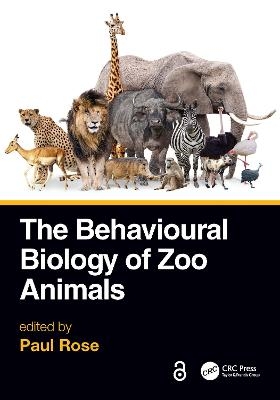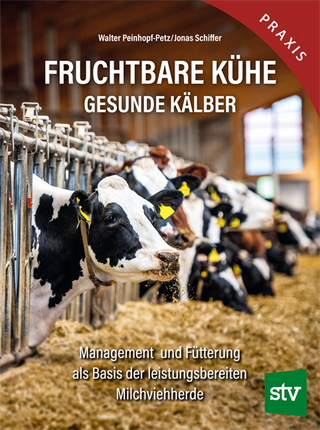
The Behavioural Biology of Zoo Animals
CRC Press (Verlag)
978-1-032-07716-1 (ISBN)
"Zoo animals" as a population are a diverse array of species from all around the globe. When managed in captivity, it is important that key aspects of natural ecology are factored into animal care, as well as considerations relating to welfare, life history and behavioural needs. The Behavioural Biology of Zoo Animals is the first book on captive animal behaviour and how this applies to welfare.
The book enables all aspects of zoo husbandry and management (nutrition, enclosure design, handling and training, enrichment, population management) to be based on a sound knowledge of the species, its evolutionary history and its natural history. Chapters from expert authors cover a vast range of taxa, from primates and elephants to marine mammals and freshwater fish, to reptiles, birds and invertebrates. A final part looks to the future, considering animal health and wellbeing, the visitor experience and future visions for zoos and aquariums.
For on-the-ground practitioners as well as students of zoo biology, animal science and welfare, this book provides an explanation of key areas of behavioural biology that are important to fulfilling the aims of the modern zoo (conservation, education, research and recreation). It explains how evidence from the wild can be implemented into captive care to support the wider aims of the zoo, shedding light on the evidence-based approaches applied to zoo biology and animal management.
Chapter 3 is available to download Open Access on the www.taylorfrancis.com website under a Creative Commons Attribution-Non Commercial-No Derivatives 4.0 license.
Aa Companion Website with additional resources is freely available for all at www.bbzabook.wordpress.com and you can follow the book on Instagram at @bbza_book.
Dr Paul Rose gained his PhD in 2018, investigating the behaviour and welfare of captive flamingos using a variety of methodological approaching including social networks analysis. He is a lecturer in the Psychology Department at the University of Exeter where he specialises in animal behaviour. Paul also works for the Wildfowl & Wetlands Trust (WWT) where he manages the Animal Welfare & Ethics Committee and is a research associate for WWT’s captive animal research programme. Paul is also a lecturer on the zoo animal management courses for University Centre Sparsholt. As a member of Defra’s Zoos Expert Committee, Paul writes and reviews policy pertaining to the running and licencing of zoos and aquariums. Paul is also co-chair of the IUCN Flamingo Specialist Group and is a member of the IUCN SSC Giraffe & Okapi Specialist Group. He is the co-chair of the BIAZA Research Committee and a member of the BIAZA Bird Working Group steering committee. Paul completed his first piece of in-zoo research in 2002 and has been professionally involved in zoo animal behaviour and welfare in an academic and practitioner capacity since 2006. His research predominantly focusses on behaviour and welfare, and evidence for zoo husbandry. He is a Senior Fellow of the Higher Education Academy and a Fellow of the Zoological Society of London.
Foreword by Geoff Hosey. PART I SETTING THE SCENE. 1. Introduction to the Behavioural Biology of the Zoo. 2. Behavioural Biology in Animal Collection Planning and Conservation 3. Behavioural Biology, Conservation Genomics and Population Viability (OPEN ACCESS) 4. Behavioural Biology, Applied Zoo Science and Research 5. Behavioural Biology Methods and Data Collection in the Zoo PART II SELECTED TAXONOMIC ACCOUNTS 6. The Behavioural Biology of Primates 7. The Behavioural Biology of Ungulates and Elephants 8. The Behavioural Biology of Carnivores 9. The Behavioural Biology of Marine Mammals 10. The Behavioural Biology of Marsupials and Monotremes 11. The Behavioural Biology of Flightless Birds 12. The Behavioural Biology of Waterbirds 13. Behavioural Biology of Parrots 14. The Behavioural Biology of Hornbills, Toucans and Kingfishers 15. The Behavioural Biology of Passerines 16. The Behavioural Biology of Captive Reptiles 17. The Behavioural Biology of Amphibians 18. The Behavioural Biology of Freshwater Fishes 19. The Behavioural Biology of Marine Fishes and Sharks 20. Behavioural Biology of Invertebrates PART III FOR THE FUTURE 21. Behavioural Biology and Zoo Animal Welfare: For the Future 22. Behavioural Biology and Animal Health and Wellbeing 23. Behavioural Biology and Enhancing Visitor Education and Experiences 24. Behavioural Biology and the Zoo as a Nature Reserve 25. Behavioural Biology for the Evidence-based Keeper. Behavioural Biology and the Future Zoo: Overall Conclusions.
| Erscheinungsdatum | 17.10.2022 |
|---|---|
| Zusatzinfo | 28 Tables, color; 43 Line drawings, color; 77 Halftones, color; 120 Illustrations, color |
| Verlagsort | London |
| Sprache | englisch |
| Maße | 178 x 254 mm |
| Gewicht | 1060 g |
| Themenwelt | Naturwissenschaften ► Biologie ► Zoologie |
| Weitere Fachgebiete ► Land- / Forstwirtschaft / Fischerei | |
| ISBN-10 | 1-032-07716-6 / 1032077166 |
| ISBN-13 | 978-1-032-07716-1 / 9781032077161 |
| Zustand | Neuware |
| Haben Sie eine Frage zum Produkt? |
aus dem Bereich


